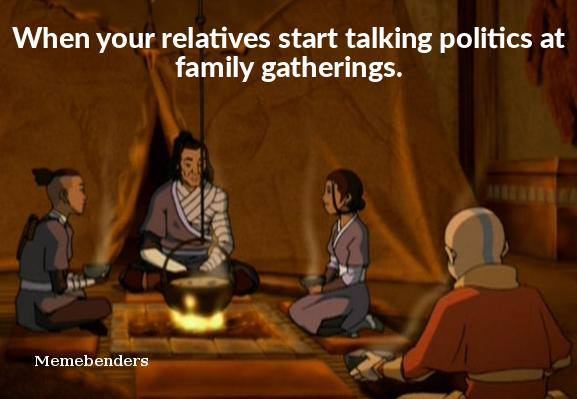By Sojin Shin || Opinion & Editorial Editor

Photo Courtesy of Imgur.com
Primaries are happening, the presidential election is drawing nearer, and most F&M students are heading back home for spring break. For those of us whose political opinions do not line up with our parents’, it can be a tricky time of the year.
My instinct is to stay away from these topics, but hey, sometimes it happens. In fact, political topics come up when you least expect them. Sometimes, you are just at the mall, eating chicken teriyaki from a styrofoam container and trying to catch up with your most beloved uncle. Then he says something that makes your blood freeze for a second: “So, who are you voting for?”
As a person from South Korea, a nation that transitioned from a totalitarian government to full-blow democracy (we impeached our last president in 2017, mostly through civil disobedience and peaceful protests) over the span of 60 years, I have encountered many situations when I deeply disagreed with someone I loved. I have made mistakes, argued, gotten upset, and pretended I was less upset when I was called down for dinner. Over the years, however, I learned to talk about my perspectives when political and social topics inevitably surfaced. The key is really simple: make a conversation.
When you are talking with your parents or family members, remember that you are discussing rather than debating. In debates, the ultimate goal is to win. In discussions, the goal is simply to lay down as many different ideas as possible. So, don’t use accusatory language such as “You are wrong,” “You are ___,” or “It is unacceptable to.” Open conversations with phrases with modifiers such as “in my opinion….”, “I think”, or likewise. It doesn’t matter how right we think we are. You are likely eating dinner, watching sports, or whatever your family tradition is. You don’t have to create an arbitrary battle where nothing is to be really gained.
Along the same lines, be careful how you use research. With the advent of smartphones and Google, we have all the information available in the world at our fingertips. Sometimes, when someone proposes an argument, it is so easy to pull up a statistic, reject their logic with numbers, pie charts, bar graphs….the list goes on. This is particularly easy if a person is seriously misinformed (because, well, we all secretly know that we are always right). But here is something to consider- it can be humiliating to be wrong, especially if the other person is a jerk about it. While it might be effective to completely crush an opponent with facts in a public debate, in this case you are talking to a beloved (or at least somewhat related) person.
Instead, recognize the sense and logic in the person’s argument. Take a moment to understand, to think about their backgrounds and experiences, and to realize why they might think and speak the way they do. You might understand them. You might feel pity for them. You might, as unlikely as it sounds, agree with them, even. Through conversations like these with my mother and grandparents, I have found so much common ground. While we do not agree on everything, we learned that love and empathy can coexist with our differences.
Having said that, I understand that these tactics are not applicable to all situations. There are domineering people whose goals are not to discuss various issues but to dominate the conversation. I have been friends with numerous people from LGBTQ+ communities (something I view as being more related to ethics than politics) whose pains have been trivialized and mocked by their own parents. I have been friends with a Christian girl who was branded by her friends as anti-feminist and backwards the moment she voiced a concern about abortion. While I did not agree with her, I felt skeptical about the expediency at which the renouncement happened.
Sometimes, a person can be marked by political ideas they hold rather than their relationship to other people. If that is the case for you, first of all, I am sorry to hear that. Secondly, don’t feel obligated to convince anyone. At the end of the day, we are all separate people, and we are all entitled to our opinions. If a loved one’s words hurt you too much, don’t bother to bear with it all. It’s not your cross to bear (nor do you really have a right to).
Sophomore Sojin Shin is the Op-Eds Editor. Her email is sshin@fandm.edu.